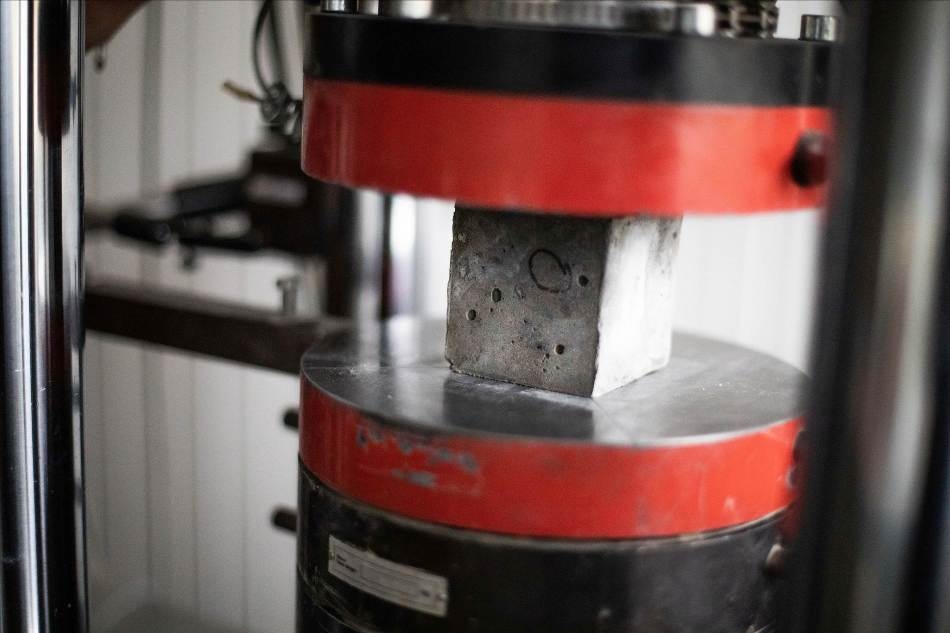Nov 1 2018
Researchers from Kaunas University of Technology (KTU), Lithuania are coming up with new techniques for producing cementless concrete using fly ash—an industrial waste.
 KTU scientists have developed alkali-activated concrete, the compressive strength of which is 55 MPa (the same as in usual concrete). (Image credit: Kaunas University of Technology)
KTU scientists have developed alkali-activated concrete, the compressive strength of which is 55 MPa (the same as in usual concrete). (Image credit: Kaunas University of Technology)
The end product that is obtained is not only as strong as the standard concrete but is also more resilient to the deteriorating effects of acid and more stable in the event of exposure to severe heat and cold.
Portland cement is a basic ingredient of concrete and is the most common type of cement used worldwide. To produce 1 metric ton of this cement, around 1 ton of carbon dioxide (CO2) is released. The global cement industry is estimated to account for 7% of annual CO2 emissions into the atmosphere. In an effort to cut down the negative impact of the concrete industry on the environment, the KTU team has been exploring ways for replacing Portland cement with other types of materials.
“At first, the idea that concrete can be produced without using cement seemed radical. Now, after several years of intensive work we succeeded to develop alkali activated concrete, which compressive strength is 55 MPa (the same as in usual concrete). Instead of Portland cement we are using alkali activated industrial waste products—fly ash, biofuel bottom ash, AlF3 production waste—silicagel etc.”, states Vytautas Bocullo, researcher at KTU Faculty of Civil Engineering and Architecture.
The researcher says that the biggest benefit of this type of binder is that during its production, a significant amount of industrial waste, which contains active form of aluminum and silicon compounds, can be utilized. At the theoretical level, any type of material that contains aluminum and silicon compounds can be employed, for example, metakaolin—a material extracted by modifying the clay mineral kaolitine—or blast furnace slag.
These materials are normally treated with a unique alkaline solution and they begin to melt and bind in a way similar to standard cement. Based on the composition, the end product can be either alkali-activated material or geopolymer. Furthermore, alkali-activated concrete is highly resilient to the effects of acid and fire. This concrete also has a higher pH, and as a result, it protects armature against corrosion.
Bocullo maintains that instead of standard concrete, alkali-activated concrete can be utilized in many different fields. Moreover, this concrete is turning out to be a globally popular substitute to standard concrete. Through a proper preparation of raw materials as well as the activating solution, such a type of concrete is solidifying in the typical (+20 °C) temperature. Yet, to produce this type of concrete in a cost-efficient manner, the use of local materials is recommended.
“We are trying to use waste materials from local industry, such as aluminium fluoride production waste—silica gel and biofuel ash. The preparation of the substance depends on the material itself. For example, fly ash of coal can be used instantly, but the biofuel ash need to be grinded up to the fineness of the cement. In order to improve the qualities of the final product, several substances can be mixed, but before that their chemical composition and additives need to be investigated for their impact on the environment and on the compressive strength of the concrete”, states Bocullo.
The research teams working in the KTU Faculty of Civil Engineering and Architecture are also testing and devising other types of concrete mixtures, for example, ultra-high performance concrete (that is currently being utilized for safe production), self-renewing concrete, and others.